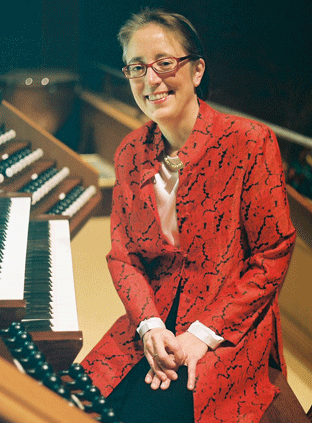
WAUWATOSA — After the French organist’s 90-minute concert on the new Shantz organ at St. Jude Parish, Jim Pluer, the music director, could muster just one word: “Wow!”
Sophie-Veronique Cauchefer-Choplin, titular organist at St. Suplice in Paris, had just concluded the stirring “Final” from JJ Grunenwald’s “Symphony No. 1” during her Nov. 7 recital at St. Jude.
A crowd of perhaps 300 stood in appreciation of the considerable talents of Cauchefer-Choplin, who came to the choir loft railing to acknowledge the praise, raising her hands to either side as if to say, “It was nothing … the pipes did all the work.”
The three-manual pipe organ at St. Jude, installed earlier this year to replace an aging instrument, boasts 40 ranks with eight additional stops in the main organ. Preceding the concert, Pluer indicated how lucky he is to be able to play it every day and how fortunate the church is to have someone of the caliber of Cauchefer-Choplin to put the pipes through their paces.
“I am ecstatic about this and so excited,” said Pluer of the guest organist’s concert.
Fr. Charles Conley, St. Jude pastor, also praised the organist prior to the concert saying, “We are truly honored and privileged.” Adding his words of welcome were John Schubring, dean of the American Guild of Organists Milwaukee Chapter, which co-sponsored the event. Two representatives of the Shantz Organ Company of Orrville, Ohio, were also present at the recital.
Cauchefer-Choplin has given recitals in Europe, Russia, Japan, Singapore, China, Iceland, Canada and Australia. She was honored by the French Ministry of Culture in 1980 and was the first woman to win the second prize in improvisation at the Chartres International Organ Improvisation Competition.
A professor at the Royal College of Music of London, she judges international organ competitions and has recorded several CDs. Cauchefer-Choplin is considered one of the best improvisers of her time.
She demonstrated her talent during the “improvisation on a submitted theme” which followed the “Final.”
Pluer explained, before Cauchefer-Choplin played that piece, that she had been given three themes from which to choose. A petite woman, Cauchefer-Choplin came to the railing and explained in heavily accented English that she had chosen “For All the Saints” to improvise as a thank you to Pluer and Fr. Conley, as well as to the parishioners. The organ is situated in two chambers in the gallery that flank the church’s large “All Saints” window.
Without any music in front of her she wove the familiar melody throughout the improvisation. Sometimes it was quick and loud, other times slow and foreboding, yet again soft and sweet, almost playful. After a crescendo came the sound of tinkling bells, the sort of sound one would imagine snowflakes might make if they were musical.
The improvisation followed a recital that included pieces by Bach (“Catechism Chorales”) and Mendelssohn (“Our Father”), as well as several other composers, during which Cauchefer-Choplin sculpted the sounds, infusing body language into each note – shoulders rising and falling, hands lifted high and then caressing the keyboard, body arching low during a dramatic phrase.
During the concert, many people turned sideways to look up and watch the organist in the choir loft.
Even those without musical training had to appreciate the breadth of Cauchefer-Choplin’s talents and the capabilities of St. Jude’s new organ.
In acknowledgement of both, the audience again stood for a long time after the improvisation. Cauchefer-Choplin bowed low to the railing and again raised her arms to acknowledge the pipes on either side, and then gave a “thumbs up” sign.
At the audience’s urging she played an encore, which also elicited a standing ovation.
